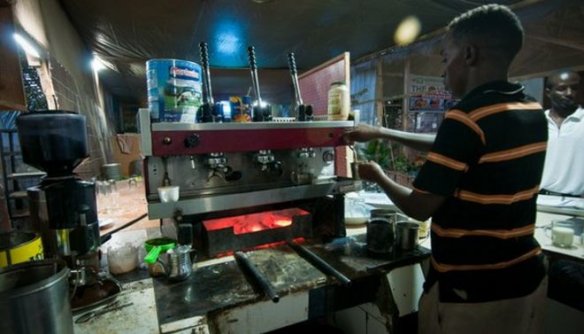In most post-conflict contexts, returning diaspora members contribute to reconstruction efforts; including through investments in businesses.
While many invest in traditional ventures, others introduce new ideas for entrepreneurship. In Somalia, diaspora businesses are visible and valued; especially for their development and peacebuilding potential. The conflict has affected Somali citizens inside and outside the Somali region for over 25 years. With the cautious optimism about developments in south-central Somalia in the last few years, however, we see the number of people returning to the region increasing considerably. Full daily flights into Mogadishu offered by Turkish Airlines attest to this.

Living in a recovering failed state like Somalia means being innovative. At The Village Restaurant, a popular open-air hangout for Mogadishu’s returning diaspora community, a charcoal-powered Italian espresso machine brews Somalia’s best cappuccino. Photo: BBC
Returning for business
A number of those returning, do so to engage in business activities. These returnees with business plans or –ventures often have made several visits to the region where they want to invest in order to check out the security situation and investment climate. Many of those who succeed have not just amassed the financial capital to do so, but they have developed their competence while abroad, through formal studies or business experience. In Norway in particular, the combination of good opportunities for higher education but a difficult labour market to penetrate, leads returnees to decide to contribute their skills in Somalia.
Many Somali families lead transnational lives, which impacts business initiatives. Start-up capital for smaller businesses is often collected through remittances from relatives abroad. Furthermore, family members with a base in different countries collaborate to move goods and cash between those locations. Some of the most internationally well-known and successful businesses, including remittance company Dahabshiil, are transnational family businesses.
While many invest in traditional business ventures, others introduce new ideas of entrepreneurship to Somalia. New business ideas, concepts and ways of doing business are introduced from places like Norway and the US; bringing taxi companies, gyms, real estate offices, employment agencies, florists and drycleaners to Mogadishu and other cities in Somalia.
Challenges faced
The fact that that Somalis from the diaspora are returning to engage in business, is generally appreciated by non-diaspora residents and Somali diaspora members alike. The positive economic effects are praised, in particular in terms of jobs and contracts, but maybe also in that these business help increase the sense of ‘normal life’ returning to Somalia. At the same time, starting up a business in Somalia may allow returnees to reclaim their own lives.
Yet while business is generally the most appreciated contribution upon return, frictions between locals and diaspora exist. Return has led to inflation of prices and salaries; a number of business types mainly focus on diaspora clients and/or are not seen as compatible with local realities; and diaspora often attach far more importance to their own contributions than non-diaspora residents do.
Numbers of returnee investors are still small and many potential investors do not invest in Somalia. There are a number of challenges that prevent returnees from setting up businesses. First, a start-up capital is required and, unlike in many other places, in Somalia there are little to no opportunities to get such capital from financial institutions. Second, for a business to be successful, it is essential to understand the market well. As such, well-functioning and relevant local networks are crucial. This may be a challenge for those who have not been living in Somalia for many years.
Third, in a conflict and post-conflict setting investors face considerable risks. A fragile security situation in parts of Somalia may mean that all investments in those areas can be lost at any time. Weak government structures also limit opportunities, as there is limited protection while legal and fiscal systems are not in place. Security remains a serious concern and diaspora businesses like Village Restaurant are deliberately targeted by Al Shabaab.
At the same time, those returning for business are often motivated by a wish to contribute to economic development and stability; at times with explicit peacebuilding aims. Youth employment is for example mentioned as a deliberate strategy to address Al-Shabaab recruitment. International donors should explore options to support for-profit ventures. Such support could address some of the challenges investors face, including the lack of start-up capital; difficult access to relevant local networks; and limited insurance against risks.
- Read more in the recently published PRIO Policy Brief ‘Back in Business. Diaspora Return to Somalia‘.